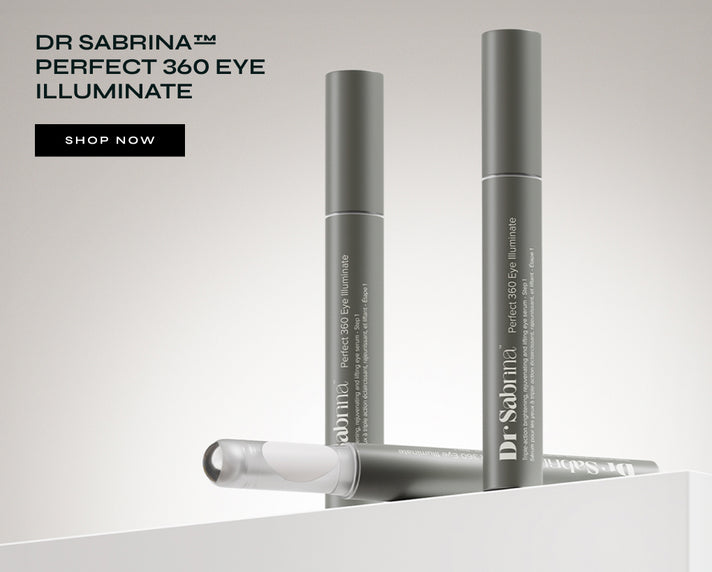Eye Serum
Eye Care Routine for Good Eye Health

As we age, our bodies go through many changes, and our eyes are no different. Over time, we may notice it becoming harder to focus on nearby objects, adjust to changing light conditions, or see as clearly as before. Being aware of these changes early on can help us take steps to manage them and reduce their impact on daily life.
Here are a few simple habits you can adopt as part of your daily eye care routine to keep your eyes healthy.
Eye Care Routine for Healthy Eyes & Better Vision
1. Eat a Balanced Diet
A healthy diet is key to good vision. Nutrients such as omega-3s, lutein, zinc, and vitamins C and E help lower the risk of eye problems like cataracts and macular degeneration. Include these foods in your diet for better eye health:
- Leafy Greens: Spinach, kale, and romaine for antioxidants.
- Cruciferous Veggies: Broccoli and Brussels sprouts for vitamins.
- Fatty Fish: Salmon and sardines for omega-3s.
- Bright Veggies: Carrots and red peppers for vitamin A.
- Proteins: Eggs, nuts, and beans.
- Citrus Fruits: Oranges and kiwis for vitamin C.
- Zinc Sources: Chickpeas and yoghurt for retinal health.
2. Protect Your Eyes from UV Rays
Spending too much time in the sun without proper eye protection can harm your vision and increase the likelihood of developing cataracts or macular degeneration. To protect your eyes, wear sunglasses that block 99-100% of UVA and UVB rays whenever you're outside, even if it's cloudy. For extra safety, opt for wrap-around sunglasses and wide-brimmed hats to shield your eyes from sunlight coming from all angles. Incorporating sun protection into your under eye care routine can also reduce the risk of fine lines and premature ageing.
3. Limit Screen Time
Spending too much time on screens can lead to digital eye strain, causing dryness and discomfort. To prevent this, use the 20-20-20 rule: every 20 minutes, look at something 20 feet away for at least 20 seconds to give your eyes a break. To reduce eye strain, position your screen about 20 inches from your eyes. Consider using blue-light-blocking glasses and reducing screen brightness for additional comfort.
If you’re dealing with screen-related strain, read more about how to relieve tired eyes naturally to soothe and refresh them effectively.
4. Practice Good Hygiene
Cleanliness is key to preventing infections. Wash your hands well before touching your eyes, especially if you're putting on or removing contact lenses. Always remove makeup before bed, as leftover cosmetics can lead to bacterial growth and infections like conjunctivitis. Replace eye makeup every three months to prevent contamination. If you follow an eye skincare regimen, ensure you use gentle, hypoallergenic products suitable for sensitive areas like the eyelids.
5. Exercise Your Eyes
Performing simple eye exercises can relax and strengthen your eyes. Practices like palming (covering your eyes with warm hands), focusing on objects at varying distances, and eye rotations improve focus and reduce tiredness. Regularly engaging in these exercises enhances flexibility and coordination of eye muscles and should be part of your daily eye care routine.
6. Avoid Smoking
Smoking increases the risk of serious eye issues like cataracts, optic nerve damage, and macular degeneration. Quitting tobacco can be challenging because nicotine tricks the brain into craving more. Symptoms like irritability, trouble focusing, and poor sleep are common during withdrawal but typically improve after a few weeks.
To quit successfully, replace smoking with healthy habits like walking, listening to music, or texting a friend when cravings strike. If you don’t succeed on your first try, don’t give up—it’s normal to need multiple attempts. For extra support, ask your doctor for advice, as even a few tips can improve your chances of quitting for good.
7. Keep Your Eyes Moist
Dry eyes can be uncomfortable and reduce vision quality. To keep your eyes moist, use artificial tears or lubricating eye drops, especially if you spend long hours in air-conditioned environments or in front of screens. Blinking more often and staying hydrated by drinking plenty of water also helps.
8. Wear Protective Eyewear
Protective eyewear prevents injuries or exposure to harmful elements. Use safety goggles when working with chemicals, tools, or during sports. Sunglasses that block UV rays also protect your eyes from sun damage and reduce the risk of long-term conditions like cataracts.
9. Get Enough Sleep
Getting enough sleep is crucial for keeping your eyes healthy. It helps them recover and relax after a day of use. Aim for 7 to 9 hours of sleep each night to support eye health. Poor sleep can lead to dry, tired eyes and blurry vision, so maintaining a healthy sleep schedule is important. To aid your under-eye rejuvenation overnight, try incorporating a quality under eye serum into your nighttime routine that targets puffiness and dark circles.
10. Schedule Regular Eye Exams
It's important to visit an eye doctor every year, even if your vision seems fine. Regular checkups help detect issues like glaucoma, cataracts, or macular degeneration early before they cause major problems. During these exams, your doctor will test your vision, check for eye pressure, and assess your retina's health. They can recommend lubricating eye drops or update your glasses or contact lens prescription. Early detection and personalised care go a long way in maintaining healthy vision.
Now You Know All About Eye Care Routine for Good Eye Health
Prevention is better than cure; it’s best to take care of your eyes before any vision problems arise. Simple habits like eating nutritious foods, staying active, and scheduling regular eye exams can go a long way in keeping your eyes healthy. Detecting and treating eye issues early often leads to better outcomes and helps maintain long-term vision health. Make these practices part of your daily eye care routine to safeguard both your eyesight and overall health.
Frequently Asked Questions
1. How can I improve my eye health?
Protecting your vision starts with simple habits:
- Wear sunglasses outdoors, even when it’s cloudy, to block harmful UV rays.
- Maintain a healthy diet full of fruits, vegetables, and omega-3 fatty acids to support eye health.
- Avoid smoking to lower your chances of developing eye diseases.
- Use protective eyewear during activities that pose risks to your eyes.
- Stay physically active to promote healthy blood flow to your eyes.
- Take breaks from screens, get enough sleep, and keep your eyes hydrated with lubricating drops when needed.
2. Is cold water good for your eyes?
Yes, cold compresses can soothe discomfort like swelling, dryness, and irritation. They are a safe and effective remedy for conditions like allergies or mild pain.
3. Is hot water safe for your eyes?
No, direct exposure to hot water can seriously harm your eyes, potentially causing injuries or even vision loss. Always handle hot water with care to avoid accidents. Warm compresses are therapeutic for blepharitis.
4. What foods are bad for eye health?
Foods with a high glycaemic index, like white bread, packaged cereals, cakes, and doughnuts, can negatively impact eye health by spiking blood sugar levels. For improved vision, choose whole grains, fresh fruits, vegetables, nuts, and beans instead.
5. What Vitamins and Nutrients Support Eye Health?
Certain vitamins and minerals may help protect your vision or slow the progression of eye conditions, including:
- Vitamin A: Supports good vision and prevents dryness.
- Vitamins C and E: Protect the eyes from damage caused by oxidative stress.
- Zinc and Copper: Help maintain retinal health.
- Lutein and Zeaxanthin: Reduce the risk of age-related eye issues.Eye Care Routine for Good Eye HealthEye Care Routine for Good Eye Health
















